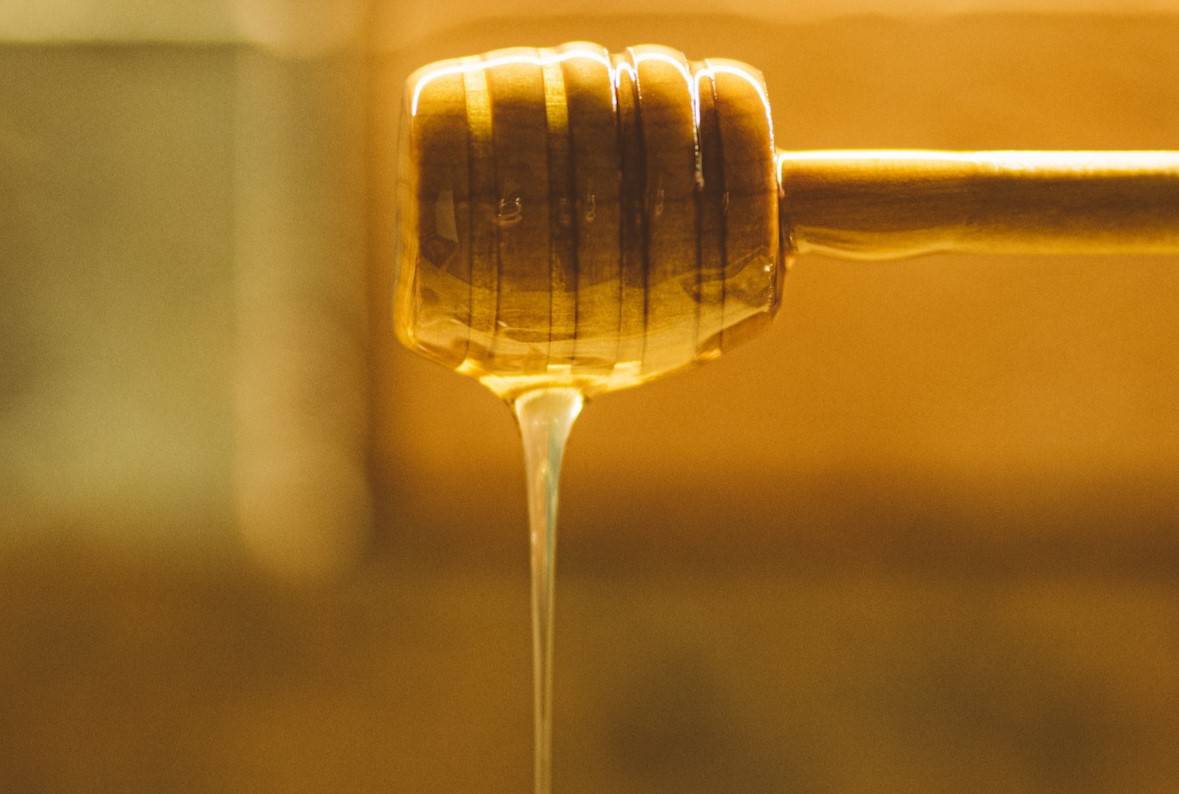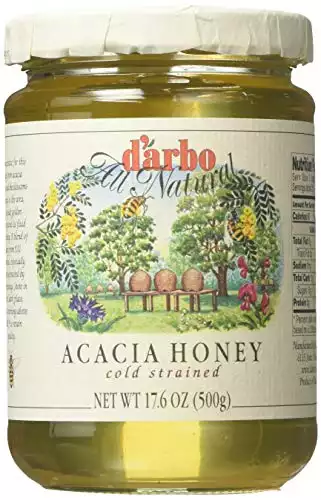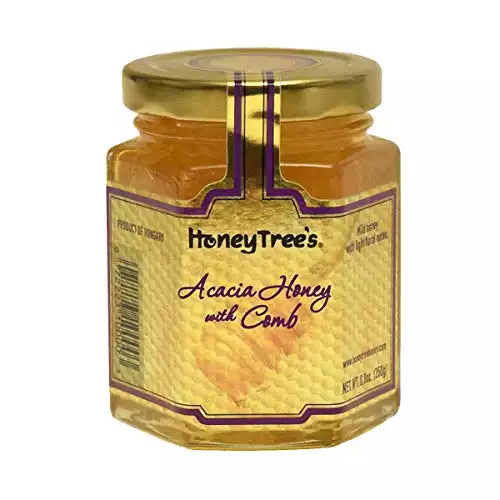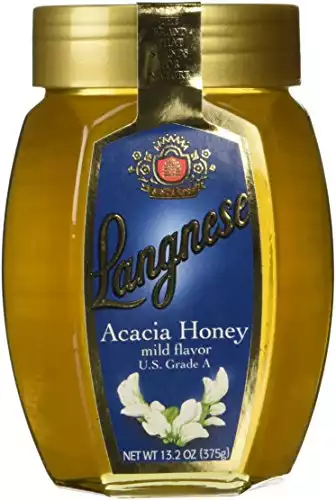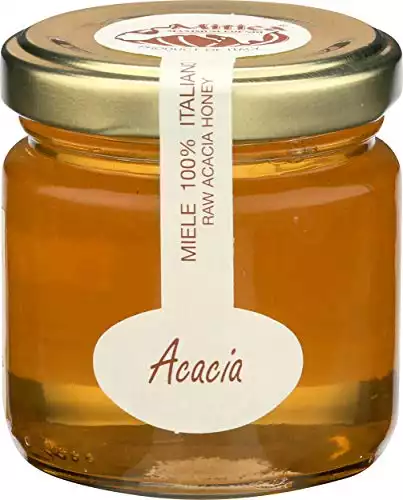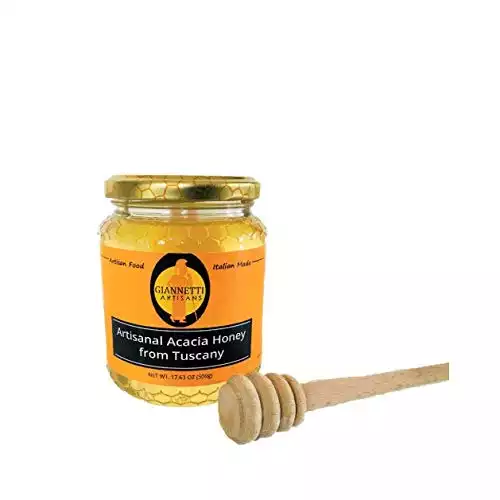Long before the discovery of sugar, Acacia honey has already been the sweetener of choice.
It attracts people with its delicate floral aroma, mildly sweet flavor, and enticing liquid glass appearance. Hence, this honey varietal remains highly sought after all over the world, even at present.
Let’s take a look at the real blossom sources, nutritional profile, health benefits, and practical uses of Acacia Honey.
|
$13.49
|
N/A
|
$18.37
|
What is Acacia Honey?
For those who want to incorporate honey into their diet, Acacia honey is the perfect introductory option with its light and delicate taste.
Compared to other honey types, this variety is usually much lighter in color, appearing almost transparent. Thus, it can be likened to a clear liquid glass that is, most of the time, colorless.
Acacia honey has a clean floral aroma, a sweet, delicate flavor with hints of vanilla, and pleasantly no aftertaste. The mildness of this honey will not overpower other flavors. It can be enjoyed in a much greater quantity than other kinds of honey.
Conveniently, this honey remains in liquid form longer, often 1-2 years after extraction. It crystallizes much slower than regular honey due to its high fructose content and low sucrose content.
It is a special organic honey from the nectar of the Black Locust tree.
The Black Locust Tree, a.k.a. False Acacia
Sorry to burst your bubble but Acacia honey, contrary to its name, does not come from an Acacia tree.
This honey comes from the Black Locust tree (Robinia pseudoacacia), or ‘False Acacia Tree.’
This tree is native to the southeastern United States and North America. However, its propagation has spread throughout the United Kingdom, Europe, Asia, and Southern Africa.
Considered an invasive species, Black locust trees grow rapidly.
It is very adaptive and grows in many soil types, microclimates, and elevations. Properly managed, it serves many great uses.
The hard and durable trees are resistant to rotting because of their high density. They are ideal for any weatherproof structure, such as outdoor furniture, decks, and fence posts.
As part of the pea or Fabaceae family, the false acacia trees fix nitrogen into the soil. It naturally fertilizes damaged or poor soils and is often used to support the nutrition of other crops.
They can quickly provide shelter and shade for animals or become windbreaks. Its leaves are food for livestock because their nutritional value is similar to that of the Alfalfa tree. Its seeds are fit for consumption in small quantities.
Black locust flowers are an essential food source for honey bees.
It is the foundation of commercial honey production in Europe. Unfortunately, they do not always produce honey. The blossoms’ nectar flow is subject to weather conditions, thereby resulting in inconsistent yield.
Also, the flower of the acacia tree has a very short bloom period of about ten days. This contributes to the scarcity of supply of acacia or black locust honey.
Prominently grown in the United States, most honey products are labeled American acacia or locust honey. But in the UK and Europe, it is sold simply as Acacia honey.
Health Benefits of Acacia Honey
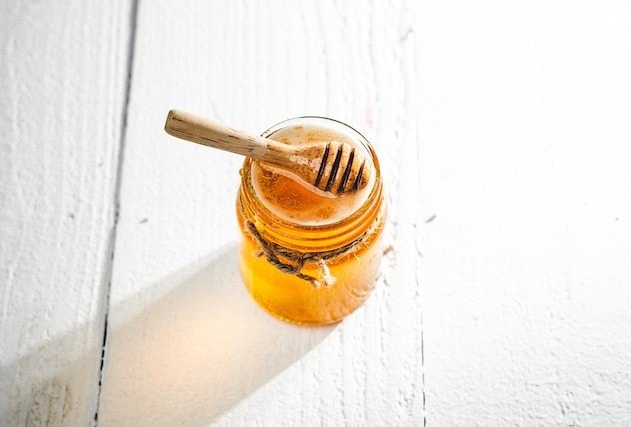
When it comes to acacia honey’s nutritional profile, it contains no protein, fat, or fiber. Yet, small traces of several vitamins and minerals, such as vitamin C, iron, and magnesium, are present.
It is the least allergenic of all other honey types due to its low pollen content. Hence, it is most suitable for many allergy sufferers. Also, its low probiotic activity equates to low gastroprotective properties.
Anti-oxidants
Acacia honey contains active compounds called flavonoids and phenolics that act as antioxidants. However, considering its pale color, it is lower than other darker honey types.
A diet high in flavonoids, an antioxidant, can lower cellular mutation and reduce your risk of chronic diseases. It also contains beta-carotene, a type of plant pigment with powerful antioxidant properties.
Antibacterial
Acacia honey’s healing abilities are attributed to its antibacterial activity.
It possesses components needed to produce and slowly release small amounts of hydrogen peroxide. This acid breaks down the bacteria’s cell walls to kill them. One study discovered that acacia honey has antibacterial efficacy in combating bacteria like S. aureus and P. aeruginosa.
Antiseptic and Anti-Inflammatory
As an antiseptic, it is useful for the treatment of body sores, diseases of the oral cavity, and skin problems. It can help reduce the appearance of wrinkles and soothe inflammation. Some people use this honey as a topical solution for burns and to decrease the appearance of scars and blemishes.
Like most varieties of honey, Acacia honey is also anti-inflammatory and fights coughs and other respiratory system issues.
Other Medical Uses
Some medical professionals consider this the best variety for people with diabetes because of its high fructose content. And it has a low glycemic index. This may also help regulate blood sugar levels.
A lot of fans of this honey have also used it to help with weight loss efforts. Mix it with water or milk to satisfy your sweet tooth. Plus, this honey stimulates metabolism as well and aids against constipation.
Not only that, but claims have it that acacia honey is effective in reducing the negative impacts of oxidative stress. Its calming effect is beneficial for alleviating insomnia and sleep apnea, leading to improved sleep.
Best Uses for Acacia Honey
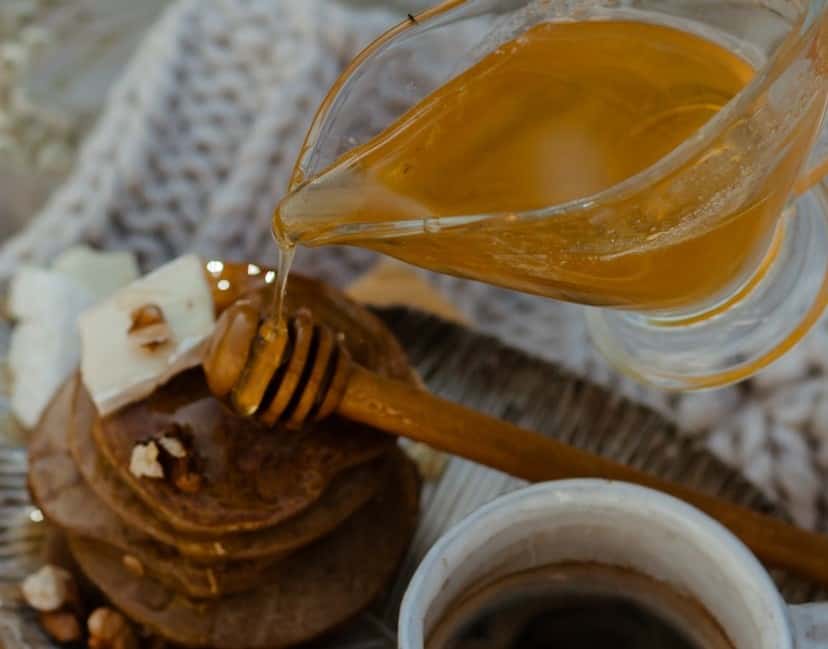
Many prefer Acacia honey as a sweetener while keeping the mind and body healthy with its low glycemic index. It also has a low acid content, so it pairs well with many food choices.
When it comes to baking, Acacia honey is good honey to use with its tinge of vanilla flavor. It adds sweetness but definitely does not overpower other flavors.
Of course, it is already delicious right out of the jar as a quick-energy snack. You could introduce honey to your kids by including this in their yogurt, cereals, and ice cream. It is ideal for sweetening your tea, milk, coffee, or refreshing drinks.
For sweet-and-sour sauces, mix it with mustard for a delicious marinade for salmon and other grilled menus.
Where can I buy Acacia Honey?
If you’re looking to taste pure Acacia honey, search for some local beekeepers. But if you cannot find one, online alternatives are available for you to order from.
Amazon.com has these products, and they also have lots of choices for you to consider.
- Characteristic of this easy-to-pour honey of acacia groves is a pale golden shading and fluid consistency.
- 100% Acacia Honey, without any preservatives! Resulting in an intensely flavored treat to savor daily!
- D’Arbo Acacia Honey has a mild, exquisite, and aromatic taste made of nectar and pollen of acacia and all blossoms growing around.
- Non GMO Project Verified
- Usda Certified Organic
- A mild honey with light floral notes.
- Prepared in a dedicated gluten-free, allergy-friendly facility.
- 13.2 ounce jar of Acacia honey.
- Light And Floral With A Hint Of Vanilla In The Finish.
- It Rarely Crystallizes Due To Its High Fructose Level And Is Ideal For Diabetics Because It Is Low In Sucrose.
- Our raw honey is unfiltered, unheated, untreated, and never pasteurized – thus leaving the natural enzymes, amino acids, vitamins, and nutrients intact. All-natural and unpasteurized.
- Wonderful for cooking and/or used to substitute sugar.
Why is Acacia Honey More Expensive?
Acacia honey is one expensive honey compared with other honey varieties. Its high price point is not only due to its impressive qualities. The tedious process of making it, limited quantities, and significantly higher demand also influence its value.
During drought seasons or even several consecutive years, the harvest of acacia honey is so scarce.
The Black locust tree starts blossoming in May, which is a bad time for bee forage. This matches the period when some bees tend to leave the hive as they cannot withstand assimilation. As a result, that causes tremendous losses and risks for beekeepers with the additional cost of strengthening their colonies.
Another factor is that the tree blooms only for 10 – 15 days. And it requires specific conditions to be useful to the honeybees.
Moreover, longer rain washes away the nectar from blossoms while the wind dries the nectars off.
But, having been tagged as one of the “Best Tasting Honey in the World,” Acacia honey is absolutely worth the price.
